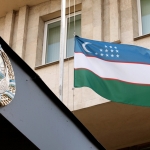15 FEBRUARY 2019 Y.
Often, wise and noble-minded rulers became heroes of oriental legends. People thought up stories about their kings, which even those kings did not imagine about such historical events. History of East is a rich of just, smart and brave Padishahs. One of them is Ulugbek, who became famous for his erudition and justice.
Great scholar, astronomer and mathematician His Majesty Ulugbek, grandson of Tamerlane, headed Maveraunahr for forty years. In the period of his reign, Samarkand obtained glory as a center of the science of the Middle Ages. “On the unanimous opinion of great and wise people, there was no such Padishah-scholar like Ulugbek in the period of Islam and even earlier, from the time of Alexander Makedonskiy.” – said Ulugbek’s contemporary.
Ulugbek was born in 1394, during one of the military campaigns of Tamerlane in the city of Sultaniya – the city between Sogdianaand Iran. From early childhood, Ulugbek admired people with his excellent mind-store and strife to getting knowledge. After the death of Tamerlane and end of the period of internecine dissension between heirs, the power came to Shakhrukh, who gave Samarkand and Maveraunahr to the reign of his son Ulugbek.
Science and culture bloomed in the period of Ulugbek’s reign. At the Registan Square Ulugbek ordered to build Madrasah, which competed for beauty and adequacy of proportion in the world. Over 100 students and teachers, well-known scholars of the epoch – Rumiy, Jamshid Kashiy, Ali Kushchi, and many others studied there. The atmosphere of music and poems, feasts and solemnity prevailed in the courtyard of this Madrasah.
One of his great deeds was the building of observatory, where he proved his deep knowledge in astronomy. His contemporaries noted that Ulugbek in astronomy was like to Ptolemy, and in geometry – to Euclid.
The observatory was built in the north of Samarkand and has an excellent beautiful atmosphere around. Historian of that time Abdurazzak wrote in his memorials: “Foundation of the building was strong like a basis of the mountain, which can stand undestroyed until Doomsday”. But, the observatory was destroyed much earlier by human greediness and cruelty. It is astonishing that accuracy of observation of Samarkand astronomers made up the hundredth share of error in spite of the absence of high-precision of optic tools. The basis of the observatory was the giant angel-meter, a vertical circle with the 40.414-meter radius.
Ulugbek created “Ziji Kuraganiy” or “Tables of stars” which was a big contribution to the treasury of world astronomy. Astronomic tables contain the coordination of over a thousand stars. Year-length, due to calculation of astronomers, makes up 365 days, 6 hours, 10 minutes and 9 seconds. Error only for one minute!
Great figures, whose sight addressed to the sky, often do not notice what is going on around them. Ulugbek also did not notice intrigues and intricacies of his friends and even relatives. He even did not see the hatred of his elder son Abdul – Latif, who dreamed to seize the power of luxury and rich Samarkand. Under the power of radical clergy, he decided to parricide his father by hiring killer.
Great Padishah Ulugbek was buried in Guri-Emir Mausoleum. According to the traditions of that time, as dead with violent death, he was buried not in a shroud, but in silk linen, – his head was accurately placed to shoulder, cut like by razor.
After the death of Ulugbek, the observatory was robbed and destroyed. The building which had to stand till Doomsday could not endure human fanaticism.
But, nevertheless, the book “Ziji Kuraganiy” was saved by Ali Kushchi, the follower of Ulugbek, who fled and brought the book to Europe. Abdul-Latif did all to erase the memory about his father forever. But, he could not imagine that it was not possible to blow out the star-like Ulugbek.














